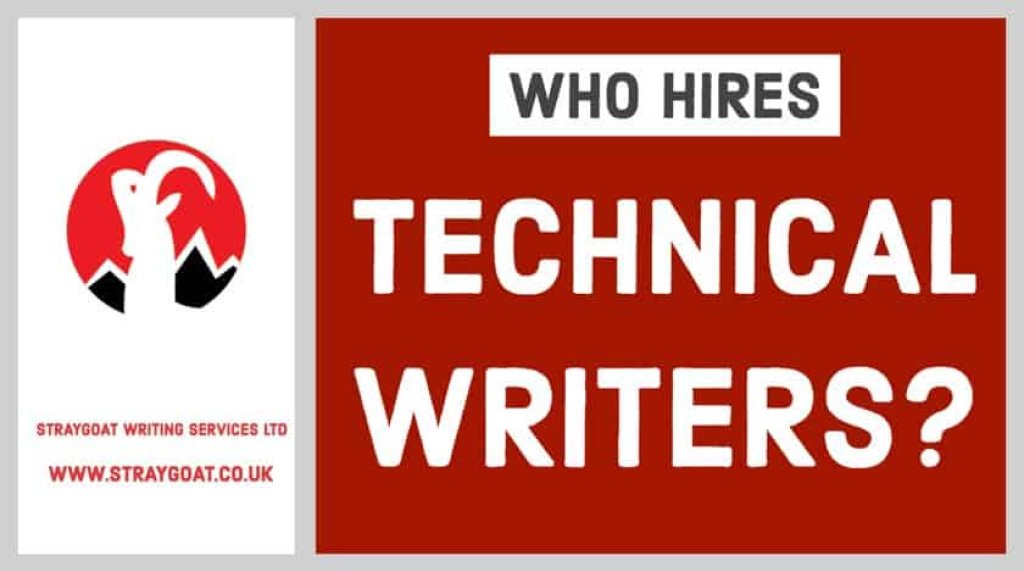
In the UK, technical writers are hired by organisations in many industries. Judging by the various job boards, software and engineering companies are still the main employers of tech writers.
Now and again, I'm contacted by someone who is interested in becoming a technical writer. They'll often ask whether they need a technical background or how to get experience, but another common question is: who hires technical writers? I guess this is because the role of technical writer is reasonably rare, in the UK at least, and a lot of people won't have worked with them before.So here I'm going to look at some of the different types of opportunities that crop up for us Brit writers.
1. Software
Lots of software companies hire technical writers for two main roles: end-user documentation and API documentation (developer documentation).End-user documentation is the content that users of the software will refer to. It's usually delivered as online help or a wiki, with some element of context-sensitive help and UX writing to provide assistance in the user interface.
API documentation explains the code, and often covers things such as how to export data from one product into another.
2. Hardware
There are lots of businesses that create physical products that need to have a user guide and/or online content. You'll be hard pressed to think of many gadgets that don't have some form of user guide. But in recent years, the trend has been to have a minimalistic user guide with more information provided online.
3. Engineering
Organisations that create engineering products and services often hire technical writers. I've known technical writers who have worked for car manufacturers and aerospace companies, for example. Some of these industries are heavily regulated, and so there are strict rules about the content and structure of the information provided.
4. Medical devices
As you'd expect, this is a heavily regulated industry too. Here, the technical writers are more often known as medical device writers, and they will need to know about the complex rules for publication. The general principles are the same as other types of hardware, though.
5. IoT and smart-tech
Are there jobs in the world of remote data collection and remote control? Oh yes. I have spent most of my career working on industrial systems that provide remote monitoring and control.
6. Government
Yes, you can work for the government as a tech writer. It's not going to be a role that is available in every local council, mind you. But I've definitely seen government technical author roles based in the South East.
7. Civil engineering/building
Civil engineering projects have a ton of documentation, and some companies use technical authors for some of that. In my limited experience in this area, the technical author was expected to collate documentation from all of the components used in a project and also document how the installation worked.Some technical writers get involved with tender writing in this area and then go on to become bid writers.
8. Healthcare
There are many companies that provide services to the NHS, and some of them use technical writers for their documentation. My experience in this area has been about documenting the workflows for different job roles, so that there is a documented procedure for each post.
9. Energy/Utilities
The energy and utilities companies employ technical authors to document working processes, installation instructions, etc. I know a lot of technical authors worked in the nuclear industry too (I say worked in the past tense, because there seems to have been a lot of redundancies lately!).
10. Financial technology (fin-tech)
Banks and other financial institutions use technical writers to document their systems.
So there's loads of work then?
In the UK, it really depends on where you are. There's definitely a lot more work in the South East than anywhere else, as that's where a lot of the big companies have headquarters.As a general rule (for the UK), I'd say if you want to have more opportunities, you need to be in or close to a reasonably large city. If you're freelance, it seems the further north you go, the harder it is to get a variety of work. If you're able to relocate temporarily or are happy to work away for extended periods, there is work out there. If you like to go home at night, like me, you may find yourself stuck in a job or without a job at times.Another thing to consider is that other types of writers do technical writing work too (with varying success). There are definitely some copywriters, bid writers, and content designers who are doing what I'd call technical communication.
But there's always remote work, right?
Not necessarily. There's still resistance to remote working and sometimes remote working is impractical. I've turned jobs down because I know it would be nigh on impossible to get the job done without a lot of time on site.Getting remote work from abroad is certainly possible, and it is something I've done. But you might find yourself fighting against the cost of living then, with rates being paid in other countries often lower than the UK. Plus, banks sometimes charge a fee for handling international payments, so that's another thing to consider.
Just because they could hire technical writers, don't assume they do
In all my time as a technical writer, I've seen loads of badly written documents and user guides that are little more than a list of features. That's because they are created by people who do different jobs. It's not that uncommon to see engineers and developers put together Word documents or wikis as the product documentation.Unfortunately, high quality documentation isn't always seen as a high priority. Which is amazing really, as for a lot of customers, it is going to be their first point of contact with the company. So if the documentation is poor or out-of-date, it has an immediate impact on the user experience.
Advice on becoming a technical author
If you're thinking about becoming a technical author, first consider whether you have the skills needed. Even if you already have some writing experience, I recommend that you take a technical writing course. Technical writing is different to most other types of business writing and there are a lot of things that are 'best practice' that you probably wouldn't notice from the published content.Secondly, consider where you live and where you are willing to work. Look at the job boards, like indeed.co.uk, for a few months and see how many jobs crop up. Also consider registering with specialist documentation agencies, like 3di, Authoring House, and Cherryleaf.




